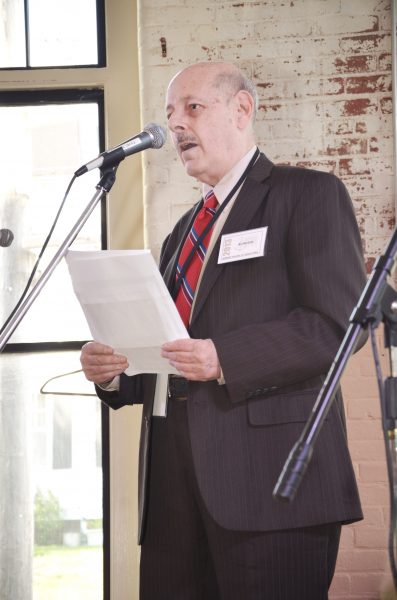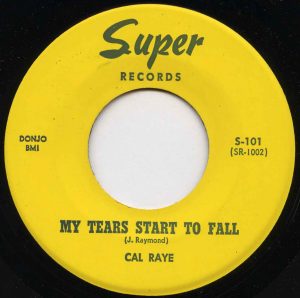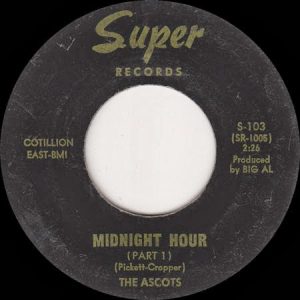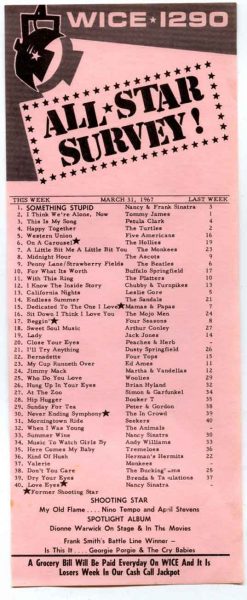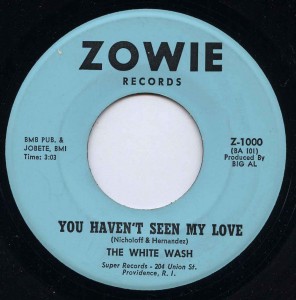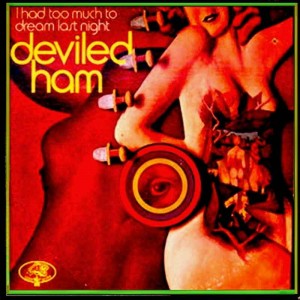Big Al Pavlow/Super Records/Music House Publishing
THE STORY OF “BIG AL” PAVLOW, SUPER RECORDS
& MUSIC HOUSE PUBLISHING
ALLAN “BIG AL” PAVLOW 1938-2016
It is with great sadness that the Rhode Island Music Hall of Fame notes the passing of one of our founders, Allan “Big Al” Pavlow, on Sunday, April 10. Big Al was internationally known for his encyclopedic knowledge of popular music and was the author of several books on the music business and record collecting, most notably the best-selling “The R&B Book: A Disc-History of Rhythm & Blues.” He ran the Big Al’s Records and Cheap Records shops in downtown Providence in the 1960s and ‘70s and was a record producer of note scoring major regional hits with The Ascots on his Super Records imprint and enjoyed a national release with Deviled Ham for Buddah Records. In the early 2000s, he was one of the driving forces behind the Rhode Island Popular Music Archive, a website dedicated to preserving and celebrating the Ocean State’s rich musical heritage. When the Archive merged with a group on the same mission from the Blackstone Valley Tourism Council to form the Rhode Island Music Hall of Fame (RIMHOF) in 2011, Big Al was one of the founders and served on the Board of Directors until his passing.
SUPER RECORDS
One of the most successful of the several Rhode Island-based independent record labels which sprang up during the Rock ‘n’ Roll era was Super Records operated by Allan “Big Al” Pavlow of Providence.
By 1965, Big Al was well-established as a mover and shaker on the Rhode Island music scene. As the owner/operator of an independent record shop, Big Al’s Records in downtown Providence, Pavlow’s combination of great ears and attention to detail had made him indispensable to both the local Top 40 radio stations and the national record labels. At this time, local stations were still compiling their own playlists and there was intense competition to “add” records before the other stations with an eye to “breaking” them in the region. Pavlow regularly consulted with WPRO and WICE, the area’s two top stations, helping them to choose new sides based on his unerring taste in music and on early sales figures for new releases in his shop. Big Al’s had also become a regular stop for promo men and salesmen from the major labels, in town visiting the stations and distributors, looking for contacts.
His first foray into the music side of the record business was when he helped secure a national distribution deal for Rhode Island singer-songwriter Cal Raye and his group The Class-Airs. In 1965, Raye was experiencing a good-sized local hit on his own Coquette Records label with his now-classic arrangement of “Lovely Lies” which had charted for The Manhattan Brothers featuring Miriam Makeba in 1956. Al intervened on his behalf to get the record picked up by a major label. Utilizing both his music business connections and his reputation as a guy “with ears,” Al tipped off his connection at Laurie Records about the strong local sales of the record and, taking his cue, they decided to release it nationally on their subsidiary, Providence Records. The record continued its climb up the local charts (where it peaked at #6 on WPRO), however, it failed to move out of the southern New England market and Laurie declined to release any further sides. (The label’s name, by the way, was coincidental – it was not instituted specifically for Cal’s record; there had been previous releases on the imprint including The Mustangs’ cover of “The Dartell Stomp”).
But Pavlow believed in Cal’s talents and decided to take matters into his own hands – he’d produce and release a record himself. In the spring of 1966, the two friends traveled to New York City to record at the legendary Bell Sound studios. Two of the sides cut at that session resulted in the first release on Al’s new label, Super Records:
My Tears Start To Fall b/w You’re My Lovin’ Baby (Super S-101)
The record failed to make any waves, but Cal was well on his way to a successful career as an entertainer and disc jockey and others had begun to notice Big Al’s efforts.
Walt Davis and Buzz O’Neil, managers of one the area’s top teen bands, The Ascots out of Barrington in the East Bay area of Rhode Island, were looking to get a record out on their act. The Ascots were a classic, 1960s, five-piece Rock ‘n’ Roll band:
Rick Desilets – Lead vocal, rhythm guitar
Peter Mayhew – Lead guitar
Vin Medbury – Organ
Ted Medbury – Drums, occasional lead vocal
Mark Vinbury – Bass guitar
Davis and O’Neil asked WPRO-AM disc jockey Joe Thomas for advice and he suggested they visit Big Al at his shop. The two managers invited Al to check out the band at a WICE-sponsored “Battle of the Bands” at Crescent Park in East Providence and he accepted. (In fact, Pavlow had been sitting as a judge for this series of “battles”, but recused himself for the evening to avoid any appearance of a conflict of interest.) Al liked what he heard and saw at the show and he began attending band rehearsals, narrowing down their playlist with an eye to recording. In the summer, he and the group repaired to Bell Sound for a lengthy recording date. Two sides from those sessions, both covers, were chosen as Al’s next release in the Autumn of 1966, Super Records S-102: “Monkey See – Monkey Do”, Sam The Sham & The Pharoahs’ contribution to the teen-exploitation picture, “When The Boys Meet The Girls”, backed with The Beatles’ “You Can’t Do That.” The music directors at both major stations, WICE and WPRO, wound up deciding to go with the B-side. The record sold poorly, though it still managed to reach #37 on WICE (who also played the flip – the originally-intended A-side), but it had run its course by Christmas.
Encouraged by the reception for The Ascots’ debut, Pavlow decided to forge ahead. With an overlong recording of Wilson Pickett’s “In the Midnight Hour” and a too short version of “Mustang Sally” left in the can from the first session, Pavlow decided to edit the former into a 1 & 2 part single, the now legendary Super 103: Midnight Hour. As with many of the acts during the garage-rock era, “In The Midnight Hour” had become a staple of the band’s live act. Based not so much on the Pickett version (which, although reaching #1 on Billboard’s R&B chart in the summer of 1965, had peaked at only #21 on the Hot 100), The Ascots version referenced the “blue-eyed soul” approach of the version cut by The Young Rascals earlier in 1966 and included on their self-titled debut album. Realizing that no radio station at that time would play a five minute record – no matter how scorching the rendition – Al decided to cut the track in half with Parts 1 and 2 on the A and B sides.
Al received an initial shipment of 1,000 copies in January and got instant adds from both Providence Top 40’s; it was clear that “Midnight Hour” 1 & 2 was on its way. In the course of its 3+ months of activity, it managed to make the Top Ten on all key R.I. stations and spread into some parts of nearby Massachusetts. Although sales ran into the thousands, a slew of other regionally successful versions of “In the Midnight Hour” (Kit & the Outlaws, The Berry’s, Dick Whittington’s Cats, Michael & The Messengers, etc.) thwarted any possibility of getting a national label to pick it up. For instance, his contact at Laurie Records didn’t want “to get into a label fight” over it. In the end all the other versions blocked each other from becoming a national hit.
Al and the band stayed the course for two more releases but could not repeat the success of “Midnight Hour”. They returned to Bell Sound for another session which resulted in the release of “Sookie Sookie”, a cover of a Don Covay B-side, but the record failed to chart. (This release pre-dates the cover by Steppenwolf by more than a year.) They changed direction slightly for one last major session at Bell which resulted in a highly original, Vanilla Fudge-styled, slowed down arrangement of the Kinks’ “I Need You” featuring drummer Ted Medbury on lead vocal. “I Need You” sold out its initial run just as it peaked at #10 on WICE eliminating the need for further pressings and guaranteeing that Super #105 would be not only be the rarest Super Record , but also one of the rarest of all charted Sixties garage band singles.
Although not much happened with the record, Al and the band continued refining the new sound and developed the makings of a “concept” album. The four friends returned again to Bell Sound with the new material (including 2 Vin Medbury originals) and cut an album whose centerpiece was a 21 minute, side-long take on Edgar Allan Poe’s “The Raven” sung/recited over a medley of The Electric Prunes’ “I Had Too Much To Dream Last Night” and the theme song from the motion picture picture Rosemary’s Baby. With a concept ahead of the curve in both the shift toward longer pieces of Rock music and in the added theatrical elements such as lighting and costuming, the band was attracting a rapidly-growing fan base in the area. With their unique and completed master as their calling card, they looked to grab the ultimate prize – the brass ring – for any “local” band: a deal with a nationally distributed label.
The band at this time underwent one final name change to Deviled Ham. Looking to demonstrate to prospective labels the visual appeal of this band, Al hired Cambridge, Massachusetts-based film maker Ken Brown to produce a 20 minute promo flick, perhaps the VERY FIRST LONG-FORM CLIP to push an LP cut, and almost certainly the first financed totally out-of-pocket by an independent producer. Neil Bogart, then presiding at Buddah Records, famous for its bubblegum singles hits, was looking to “hip up” the label by signing underground acts like Elephant’s Memory and Eire Apparent. The Deviled Ham seemed to be a great fit and they were signed instantly. “I Had Too Much to Dream Last Night” was ultimately issued on Buddah’s subsidiary, Super-K 6003 in the Spring of 1970 with no single release to support it. The success of some underground LPs (e.g. Arlo Guthrie’s “Alice’s Restaurant” ) led labels to believe that they could issue product with no Top 40 promotion and still score big. Alas, this tactic failed for most labels that tried it and as collectors of LPs from the early Seventies “Great Cutout Album Dump” will happily attest: yesterday’s losers are tomorrow’s rarities.
Today, Deviled Ham is listed at $25 in many price guides (higher if still sealed) while critics debate their merits or lack thereof. Love ’em or hate ’em, they are official members of the FIRST ROCK BAND ERA and at the very least, it’s an important piece of Rhode Island music history placing homegrown talent at the center of the storm in the late 1960s.
– Rick Bellaire, March, 2011
SUPER RECORDS/BIG AL PAVLOW DISCOGRAPHY
Super S-101 Cal Raye: My Tears Start To Fall b/w You’re My Lovin’ Baby
Super S-102 The Ascots: You Can’t Do That b/w Monkey See – Monkey Do
Super S-103 The Ascots: Midnight Hour (Part 1) b/w Midnight Hour (Part 2)
Super S-104 The Ascots: Sookie-Sookie b/w Put Your Arms Around Me
Super S-105 The Ascots: I Need You b/w Knock On Wood
Super S-106 The American Rebels: Rebel Song b/w Rebel Theme
Somethin’ Groovy SG-500 The Specktrum: Confetti b/w I Was A Fool
Zowie Z-1000 The White Wash: You Haven’t Seen My Love b/w You Better Think It Over
Super K/Buddah LP SKS-6003: Deviled Ham: I Had Too Much To Dream Last Night
MUSIC HOUSE PUBLISHING
Big Al Pavlow was a world renowned record collector and music researcher and historian. In 1983, he founded Music House Publishing and released his first volume, The R&B Book: A Disc-History of Rhythm & Blues. The book, which traced the history of R&B from 1943 to 1959, was an instant success and went through many printings. It became the “go-to” resource on the subject for the music press and the musicological community and is in library collections the world over.
He followed up the success of The R&B Book with a 20 volume series called Hot Charts he began publishing in 1994. During his career, Al had become aware of many discrepancies in hit records charts, especially those which appeared in Billboard, Cash Box and Record World. Using the charts from those three publications as well as dozens of other resources including sales reports, local and regional charts, and charts from other periodicals, Al painstakingly determined the true top 100 records of each year from 1940 to 1959 (plus “bubbling under” or near-chart successes). Again, the music research and record collectors communities snapped up the volumes in rapid succession and the series is now considered the authoritative resource on the subject of hit records.
In 2004, Al published his last book, the first in a projected series of discographies which would cross-reference recordings by the contributions of the behind-the-scenes participants – the songwriters, arrangers and producers. Pro-Files: Discographies Volume One focused on the East Coast scene which revolved around Manhattan and is now commonly referred to as “The Brill Building Era” – the conglomeration of the hundreds of record labels, production companies and publishers which occupied offices in The Brill Building itself at 1619 Broadway plus the “overflow” which had taken over the bulk of the rental space just up the street at 1650 Broadway. Once again, the book sold out quickly and became an invaluable research tool for music historians around the globe.
At the time of his passing in 2016, all of Big Al’s books were out-of-print. His close friend and associate, Andrew “Andy” Simons, a Rhode Island native who was working as a Curator for the British National Library, organized an effort with the Historical Archive Committee of the Rhode Island Music Hall of Fame to keep Al’s work available for the education and enjoyment of researchers, collectors and fans around the world. Before his death, Al had been working on Volume 2 of The R&B Book, which would have covered the years 1960 to 1975 (the evolution of Rhythm & Blues into Soul up to the beginnings of the Funk and Disco era) as well as a second volume of Pro-Files which would have documented the West Coast scene based around Los Angeles.
The Pavlow family donated Al’s hard drives to the Hall of Fame, but the only unpublished work the team was able to recover was the R&B research for 1960-1969. For the rest of the volumes, Mr. Simons set about scanning Al’s published works and has set up a website where the information is available to the public:
The REAL Record Charts by Big Al Pavlow
https://therealrecordcharts.wordpress.com
Available at the site in their entirety are Al’s three published works:
– The R&B Book: A Disc History of Rhythm & Blues
– Hot Charts 1940 to 1959
– Pro-Files: Discographies Volume One (Songwriters, Producers & Arrangers)
as well as the first two-thirds of the projected second volume of The R&B Book
– Soul Chart research 1960-1969
The Rhode Island Music Hall of Fame would like to extend our sincere gratitude to Mr. Simons for the tireless work he put into this effort and for his dedication to keeping Big Al Pavlow’s unique and important research available to the music community.
